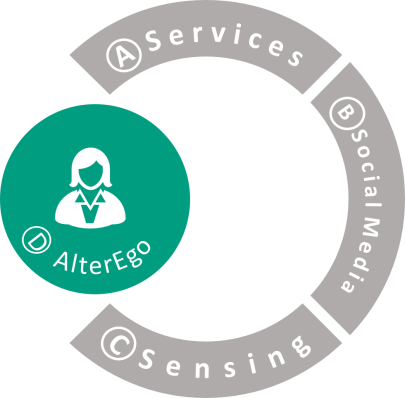Research area D is continuing the work towards the goal from Phase I, thereby privacy and trust of users is implemented by digital representatives called the AlterEgo. In Phase I the research focused on the mobile devices as an integrated, monolithic AlterEgo. However, today's mobile devices are a part of more complex infrastructures, therefore the focus in Phase II shifts to the federated components and their interplay.
The notion of federation is very general. On a high level, technical platforms can function as components in connected environments, while on a lower level the devices themselves can be seen as federation of components, e.g. consisting of hardware, operating system, software, firmware, etc. Such federated components are seen not as subordinates under the control of a single organization or a person, but under the influence of several stakeholders (manufacturers, operators, suppliers, etc.), often within competing interests. Interaction between software and hardware of a device can be understood as communication between components of different stakeholders.
Users want the federation to behave in a trustworthy and privacy-preserving manner, where the potential damage from the interaction of conflicting components is minimized. For this, intermediaries can check and ensure the proper interaction, e.g. operating system can allow installation of certified software only. Intermediaries can also be optional side operators of the components’ federation. When intermediaries are involved, the problem of the user's privacy is partially shifted to a trust and communication problem. The question is to which extent users are willing to give up their privacy towards the intermediaries in order to achieve trust and privacy on the AlterEgo side.
There is a technical challenge of enforcing user intentions through intermediaries. Research area D considers these questions in the subareas D.2 to D.5.




